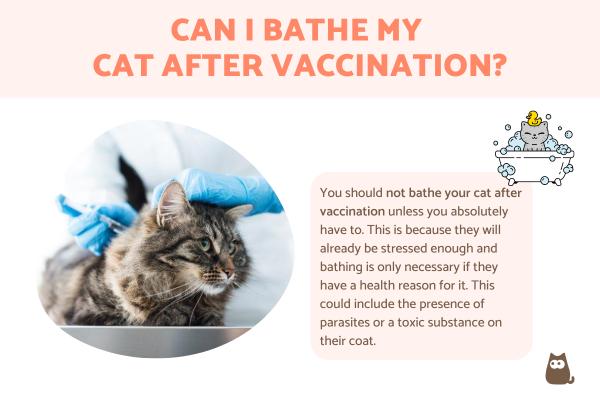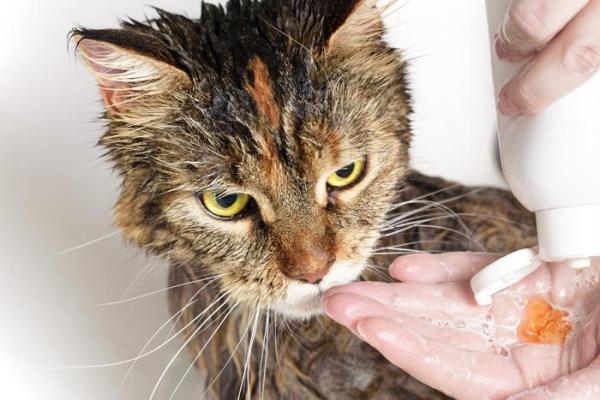
If your cat or kitten has just got their vaccines, the first thing you can do is congratulate yourself. You have helped your cat to build their immunity against potentially lethal diseases and stop certain pathologies from spreading. Many of these diseases are passed on due to cats living in unhygienic circumstances. Much of these can be avoided, although some bacterial, fungal or viral infections can occur even to those who are careful with their pet's environment.
Even though your cat has been vaccinated, you may be unsure of how long you need to wait until your cat can be bathed. This is only a consideration if you have a genuine need to bathe your cat in the first place. In most cases, you will not. If you want to know can you bathe a cat after vaccination?, AnimalWised shows you that yes you can, but you probably won't need to. In the rare circumstances that you do, we'll show you how to bathe a cat safely after vaccination.
Vaccinating cats
Our cats are susceptible to a variety of diseases throughout their lives. When they are born, they spend their time in the protection of their mother. During this time, they should be kept away from potential pathogens which lead to illness. After they separate from their mother, they must interact with a world which often puts them at risk of ill health. Some of these diseases are fatal, but all can put their general well-being at risk.
The advent of vaccines for cats is a historical moment in the history of veterinary care. They help to protect against potentially life-threatening diseases such as feline parvovirus. In their most basic sense, vaccines work by presenting the organism with a part of the virus or disease. It is such a small amount it will not harm the host, but it will trigger the immune system which will create antibodies to fight the pathogen.
Antibodies from vaccines are stored in the cat's immunological memory. This means that when the cat is attacked by these pathogens in the future, the body is able to attack them directly and prevent them from causing illness. These vaccinations are for the most common disease in cats, but may differ depending on the prevalent diseases of a certain area. For this reason, a vaccination schedule for cats will need to be established by a veterinarian.
A vaccination schedule exists because cats cannot be inoculated against all the diseases to which they may be susceptible in one shot. Instead, their vaccinations need to be spaced out to be effective and maintain the cat's health. Most vets will say that a cat needs a yearly booster shot, but this has been disputed, especially in the case of housecats. Regardless, booster shots are generally recommended as a more thorough means of inoculation.
Due to how vaccinations work on the immune system of the cat, they can cause the cat to be stressed on some occasions. As the body creates antibodies it can make the cat a little weak and perhaps more tired than usual. The stress of taking a cat to the vet for these vaccinations may also weaken them or cause upset. This process of putting them into a carrier, driving them in a car, taking them to a strange environment with other animals, being handled by strangers and then punctured with a needle can be traumatic.
Some cats or kittens may be fine when they return home, others may hide due to being upset. In rarer cases, vaccinations may also have some side effects on our feline. This could be in the form of a slight fever or lethargy up to three weeks after the vaccination. All these factors should be considered when asking how long to wait after vaccination before bathing a cat.
Vaccinating a kitten for the first time
If your cat is an adult or even an older cat, they should still be vaccinated. This may be the case if you have adopted or rescued an older cat as they may not have had the opportunity for vaccinations.
For most cats that are adopted into a new home, their first vaccination should be when they are a kitten. Soon after they are born, we should take the kitten to a veterinarian for their first checkup. During this time, the veterinarian will assess their health and provide any specific information they may require at this stage. Once this is done, they will arrange another appointment for the kitten's first vaccination.
Different regions will require different vaccinations depending on the diseases prevalent in that area. This will usually mean the kitten vaccination will be made up of combination vaccines for cats. When they need to be administered and what boosters the kitten will need is at the discretion of the vet. It is they who will determine the right vaccination schedule for the individual.
If you are unsure when to bathe a kitten after their first vaccination, you can speak to your vet during their appointment. We provide the considerations you will need to make in the sections below.
Bathing cats after vaccination
In general, cats do not need to be bathed. This is because they are naturally very clean animals. They groom themselves with their tongue on a daily basis and avoid situations where they would get dirty. For most cats, this process is sufficient to maintain excellent hygiene. In turn, this means cats do not need a human to bathe them unless there are mitigating circumstances. What these mitigating circumstances might are difficult to determine.
The main reasons a cat will need to be bathed are the following:
- Parasites: you will need to bathe a cat with fleas or other parasites to remove them from their fur and body. If we do not, the flea infestation can spread. With kittens and cats with a lowered immune system, not bathing the cat can cause serious harm.
- Very dirty: if a cat has something stuck to their fur which cannot be removed by grooming alone, we may need to bathe them to remove it and improve their hygiene. In many cases, we don't have to bathe kittens or cats fully, but can remove the stubborn dirt with a cat-friendly wipe.
- Toxic substance: if there is something on the cat's coat which could cause them harm when ingested, we need to remove it as soon as possible. Bathing may required if they need a thorough wash.
As you can see, there are few reasons why a cat or kitten will need bathed at all. Bathing a cat directly after vaccination is not necessary in the vast majority of situations.
Can you bathe a kitten after vaccination?
If you have just adopted a kitten, they should have been with their mother for a minimum of two months. Their mother will take the lead in terms of grooming and cleaning. You should not bathe them yourself as they are in a vulnerable state with compromised immunity. This is especially the case with newborn kittens.
If you have found a kitten before their weaning period is complete (perhaps due to abandonment), you may need to bathe them if they have potential hazards on their coat. This is only to be done if absolutely necessary as the process of bathing can spread bacteria in some cases.
Bathing an adult cat
Although some breeds are more fond of water than others, they don't generally care for it. Even touching their body with water can be stressful. Setting them in water can be panic inducing. This means even getting to the stage where you would apply soap or shampoo may be difficult. They are likely to lash out or try to run and hide. As a side note, it is important to remember that cats need shampoo specifically designed for felines.
Unless our cat actually enjoys the bathing process, we should not bathe our cat. Not only does it create additional stress, it is unnecessary and removes natural oils from their skin which protect it from conditions such as dermatitis. Before you ask can I bathe my cat after vaccination, ask yourself should you be doing it. If the answer is that you have no other choice but to wash them, you can look at our article on how to bathe a cat properly for the first time.
Unless they have been doused in hazardous substances or for other valid reasons, most cleaning of cats can be localized. This means taking a damp cloth and cleaning the area where they are dirty. Gently wash the area and be sure to calm your cat as you do this. You can even find some dry shampoo for cats which completely avoid wetting your kitty in the first place.

Vaccinations and bathing cats
Technically, you can bathe a cat on the same day as you have your cat vaccinated. However, there are two main reasons why you shouldn't:
- The stress of being vaccinated has made it an already difficult day for your cat. Adding to this stress is only likely to exacerbate it.
- They most likely don't need it.
Maintaining your cat's health and well-being has little to do with bathing. Completing vaccination and deworming schedules, as well as ensuring they have environmental enrichment are much more important. Leaving your cat to clean themselves is the most natural and appropriate way for maintaining their hygiene.
Also, if your cat is sick, then bathing is not ideal. It can further weaken their immune system, spread pathogens to others and seriously harm them if they are not dried properly. When the bathing a sick kitten, their already lowered immune system may not stand up well to bathing. To learn more, check out our article on can you give a sick cat a bath?

If you want to read similar articles to Can I Bathe My Cat After Vaccination?, we recommend you visit our Basic care category.